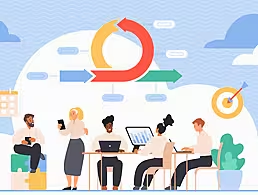Failure to bake coding into the Irish schools’ curriculum means short-changing taxpayers and generations of students to come, writes John Kennedy.
Mark Zuckerberg, who 12 years ago started Facebook from a college dorm room, learned how to code thanks to the availability of a computer at his dad’s dental practice. Bill Gates, who co-founded Microsoft 40 year ago, went to a school where the students’ mothers funded its first computer through a rummage sale.
Today, the average home in Ireland is probably littered with various concoctions of computing devices, games consoles and phones. But when kids go to school, computer education most likely involves a furtive glance at a smartphone when teacher’s not looking.
In 2011, CoderDojo co-founder James Whelton arrived unannounced at my office to tell me that the next morning the first CoderDojo would be taking place in Cork. His reason for starting it was in response to the curiosity of his fellow students – he had become world-famous a year earlier for hacking the iPod Nano – and the fact that there were no computer classes in his school. Today, the CoderDojo movement is a not-for-profit organisation where, through a network of volunteers and kids teaching other kids, there are more than 800 dojos operating in 60 countries worldwide. Within Europe alone, CoderDojo classes reach more than 25,000 students, and the organisation also runs the annual Coolest Projects Awards.
‘By limiting women in technology we are limiting ourselves to only half of the world’s solutions’
– KIMBERLY BRYANT, BLACK GIRLS CODE
If you consider the technology boom that Ireland is in the midst of – we are the envy of Europe when it comes to winning investment, and all the tech giants, including Apple, Google, Facebook, Microsoft and Oracle, have a base here – there is a direct correlation to the pioneering economic and social decisions made by TK Whitaker and Seán Lemass around trade and free secondary education in the 1960s.
They planted the seeds of this revolution, creating the foundations for Ireland to become what the head of Google in Ireland Ronan Harris calls the “data capital of Europe”, so why aren’t we moving faster to ensure this rising tide lifts all boats?
In the late 1980s, I remember teachers in my hometown taking it upon themselves in their own time to teach kids the rudimentary skills of coding. They had only just picked up these skills themselves, and I remember trudging down to the local tech on a Saturday morning with my sister to attend computer classes on old BBC Micro computers. The principal of our primary school used to encourage kids to learn the basics of coding on the old Amstrad 464 (the one with the tape recorder attached), and we had graphics competitions in 5th class. It was bittersweet to see the same machines coated in a filament of chalk dust in maths class when I arrived in secondary school a few years later. They sat for at least two or three years gathering extra layers of dust before mysteriously disappearing during a refurbishment. In fact, I remember only one computer class in secondary school and we didn’t even use computers, we just took notes. I felt short-changed.
I still felt short-changed when, after school and when the homework was done, we’d watch Grange Hill and I’d marvel at the fact that kids in England could walk from class to class indoors, unlike most of us who would shuffle in the rain between leaky, smelly old prefabs.
But life was what you made it. You knuckled down and the Irish education system was nevertheless a source of national pride, and you felt imbued with confidence no matter where you went in the world.
Are we short-changing today’s students and their parents?
Zoom forward to 2016 and the evidence is that every career choice from fashion to design and even selling will require coding skills.
So why isn’t coding on the curriculum? For a country that has gained so much from computing and is seen as a country with its finger on the pulse of change, this seems at first like a breathtaking oversight.
Last week, during a visit to Google’s Dublin operations – where over 5,000 people are employed – Fionnuala Meehan, who heads up a 500-strong team focused on SMB EMEA sales, pointed to the work being done by Google and Trinity College in gearing up Irish teachers with vital coding skills. Many are taking this to PhD level. She said that Google’s Call to Code competition has also seen a significant increase in female participation, going from zero in 2014 to 15pc in 2015.
“When we think about that confidence, changing perceptions and access for everyone, we feel it being on the curriculum is the turn-key thing that needs to happen,” Meehan said.
“We are not responsible for policy – that is the preserve of government – but, when we are asked, we really feel, as other countries have done, that this is the thing that is going to get maximum exposure for the generations to come, across all economic backgrounds, as well as across the male-female divide.”
It is 2016 and we are about to celebrate the centenary of the 1916 Rising, when a handful of poorly armed idealists occupied the GPO and what they thought were other valuable strongpoints around Dublin city. They were routed, but a spark was lit.
The fighters consisted of men and women who read a proclamation that this was to be a nation that would cherish all of its children equally.
Among those idealistic fighters was Seán Lemass, widely considered the father of modern Ireland and who, as Taoiseach from 1959 to 1966, would move Ireland away from disastrous isolationist dogma to sound principles of economic growth that brought foreign direct investment into the country.
Lemass summed up his economic philosophy: “A rising tide lifts all boats.” By this, he meant that an upsurge in the Irish economy would benefit both the richest and the poorest. Whether or not the origins of the phrase came from the Rising period, it was used a lot by Lemass, and was popularised in a speech by US President John F Kennedy in 1964.
Today, the digital rising tide should include girls in particular, and Meehan is absolutely correct in pointing out that adding coding or computer science to the school curriculum will help break the cycle of few girls going on to careers in STEM because of the stereotypes and perception they’re faced with.
The reality is that computer science is an economic force multiplier that could change not only the life of the student, but those around them. For every technology job created in Ireland, three more are created in the local economy.
Coding and computer science aren’t for everyone. But if all jobs of tomorrow are going to require some familiarity with these skills, we are doing future generations a huge disservice.
In the UK, coding has been on the schools’ curriculum since 2013.
Here are some numbers:
- There are currently 700,000 ICT job vacancies across Europe
- An economic study has revealed that Apple’s iOS app economy has created 1.2m jobs in Europe
- The Facebook platform generates $29bn of economic activity every year, and has created 600,000 jobs
- The European Commissioner for the Digital Single Market, Andrus Ansip, has predicted the European app economy will be worth €60bn by 2018, and could generate 3m jobs
- Today, there are 3bn people online, and this will grow to between 4bn and 5bn by 2020
I would like to point to a comment made by Kimberly Bryant, founder of Black Girls Code, which aims to get more girls in minority communities in the US coding because it could potentially transform their entire economic and social horizon.
At last June’s Inspirefest in Dublin, she said: “By limiting women in technology, we are limiting ourselves to only half of the world’s solutions.”
This is fundamentally true. Coding not only plants the seeds for relevant and rewarding future careers, it transcends all class, social and economic barriers. It portends a world where advancement truly depends on merit, not favour.
There are also practical arguments and reasons of fairness: not every parent may be available to bring their kids to CoderDojo on a Saturday morning, not every kid may have a computer, and certainly not every home in the country has broadband yet. Baking computer science and coding into the curriculum gives every kid a fighting chance, regardless of economic or personal circumstances.
There are rumours that coding may soon arrive in first years’ school curriculum in Ireland. Let’s hope this is true.
By failing to make this change, we will fail to consolidate the huge windfall that has come in the form of the global tech giants that have made Ireland the current data capital of Europe.
And, by failing to add coding to the school curriculum, we are once again failing to cherish all children of the state equally. This digital tide needs to raise all boats, for young women especially.




